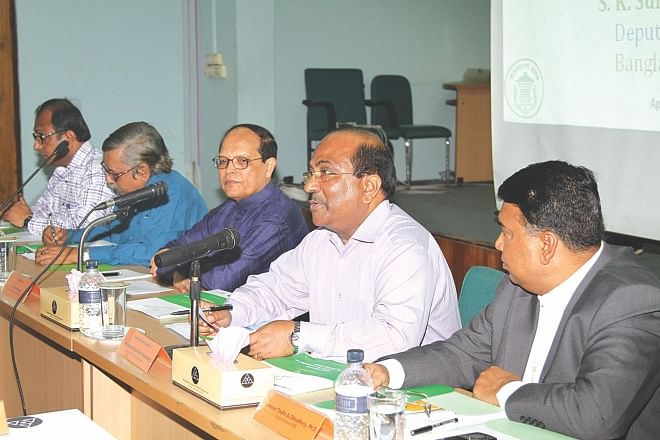Expanded tax benefits may spur banks' CSR efforts

A progressive tax exemption structure, especially for banks, will encourage them to increase their involvement in CSR activities to boost socioeconomic development, analysts said yesterday.
Progressive tax exemption means the more an institution spends on CSR activities the more tax exemption it gets.
They also urged the government either to withdraw the existing ceiling on CSR expenses or to increase the limit to get tax exemption at a rate of 10 percent, which is applicable to a company's spent amount in excess of 20 percent of its gross income or Tk 8 crore, whichever is lower.
It means a company gets the tax exemption benefit only for Tk 8 crore or for the amount equivalent to 20 percent of gross income, and there are no tax exemption privileges for additional expenses.
The analysts spoke at a roundtable on “Policy support to CSR in the context of tax exemption for the banking sector” co-organised by Bangladesh Bank, Bangladesh Institution of Bank Management, and Management and Research Development Initiative at the BIBM premises in Dhaka.
Moazzem Hossain, editor of The Financial Express, moderated the discussion. “It will be better if there is progressive tax exemption structure for banks,” said Atiur Rahman, governor of the central bank.
“In some cases, such as research and development, the amount spent on CSR activities should be absolutely tax-free.”
As the banks are regulated, they can get some more flexibility on CSR expenses than companies in other sectors, Rahman said.
CSR activities are not only for getting tax exemption benefits, but a major way of building confidence among the consumers, he said.
CSR expenditure of banks amounted to Tk 442 crore in 2013, eight times higher than in 2009, said SK Sur Chowdhury, BB deputy governor, while presenting a keynote paper at the roundtable.
“It's no exaggeration to say the banking sector led CSR initiatives in Bangladesh.”
The highest expenditure last year on CSR activities by a single bank amounted to Tk 78.54 crore, up from Tk 52.76 crore in the previous year. In 2013, the average expenditure of the banking sector was Tk 7.89 crore, Chowdhury said.
So, the tax exemption ceiling of Tk 8 crore may look sufficient for non-bank corporate firms, but certainly not for banks, he said.
Banks are on the top in terms of paying taxes and doing CSR, Chowdhury said, adding that they should get a meaningful benefit of tax exemption.
“The rate of tax exemption needs to be reviewed. It would be more logical to devise a progressive tax exemption structure that encourages increased involvement in CSR activities by banks.” There should not be any upper limit on CSR expenses for tax exemption benefits, said Khandkar Ibrahim Khaled, a former deputy governor of the central bank.
Rather there should be a lower limit, he said. If one does not spend at least Tk 1 crore or Tk 2 crore, it should not be allowed to receive tax exemption, he said.
He also recommended introducing CSR awards to socially recognise corporate entities for their contribution to socioeconomic development.
The banking regulator or the Dhaka University or Bangladesh Securities and Exchange Commission and even the government can introduce such awards, he said.
Khaled also urged the government to classify the areas of CSR activities. “More benefits should be given to the institutions whose CSR activities bring more social benefits,” he said, adding that the CSR expense in some sectors should be totally tax-free.
Syed Md Aminul Karim, a member of the National Board of Revenue, said the tax collector will consider the recommendations.
Toufic A Choudhury, director general of BIBM; Shah Md Ahsan Habib, a professor and director of BIBM; Swapan Kumar Bala, chief executive officer of Dhaka Stock Exchange; Shibli Rubayat-Ul-Islam, dean of the business studies faculty at Dhaka University; KAM Majedur Rahman, managing director of Premier Bank; and Hasibur Rahman, executive director of MRDI, also spoke.

 For all latest news, follow The Daily Star's Google News channel.
For all latest news, follow The Daily Star's Google News channel. 



Comments